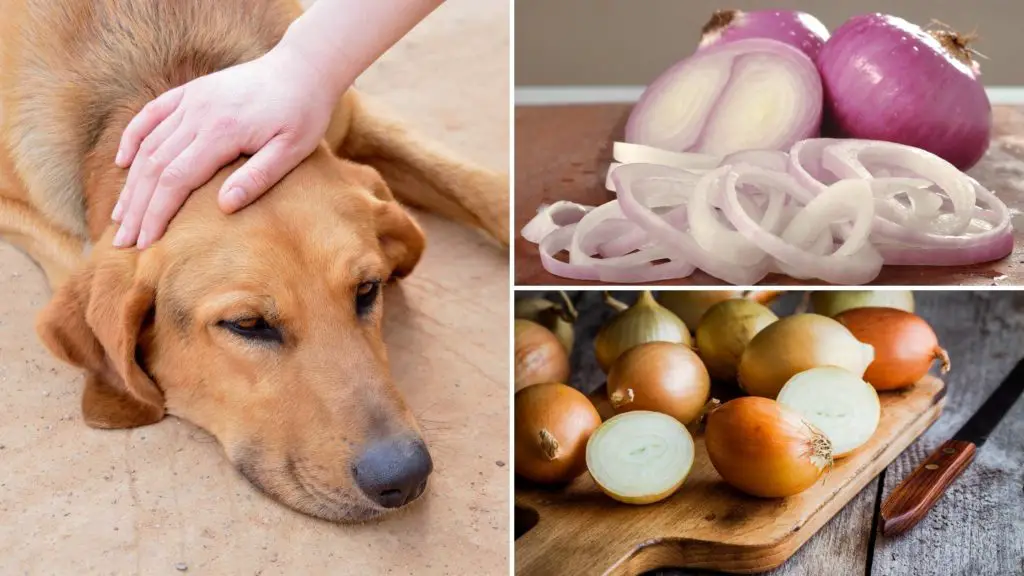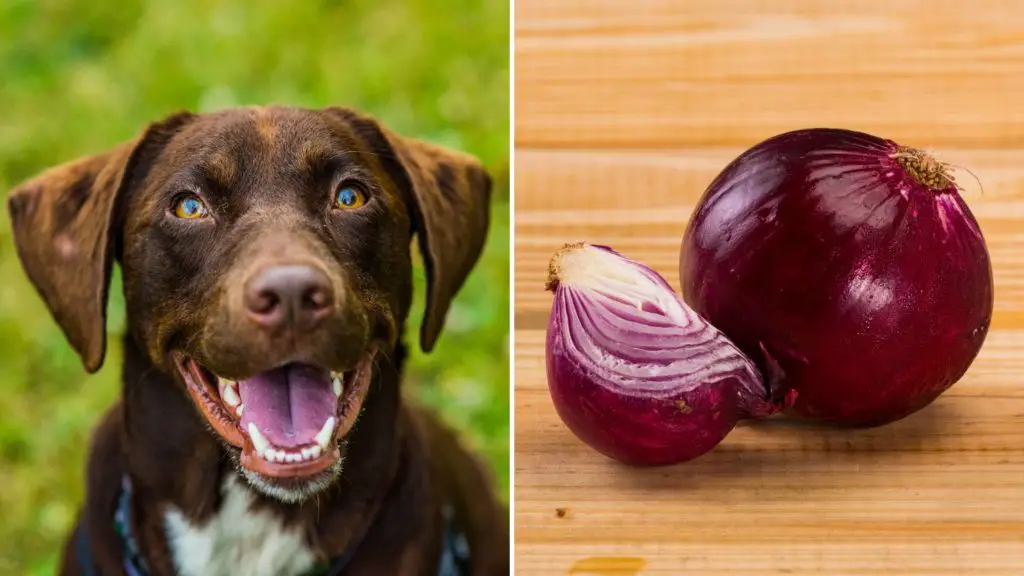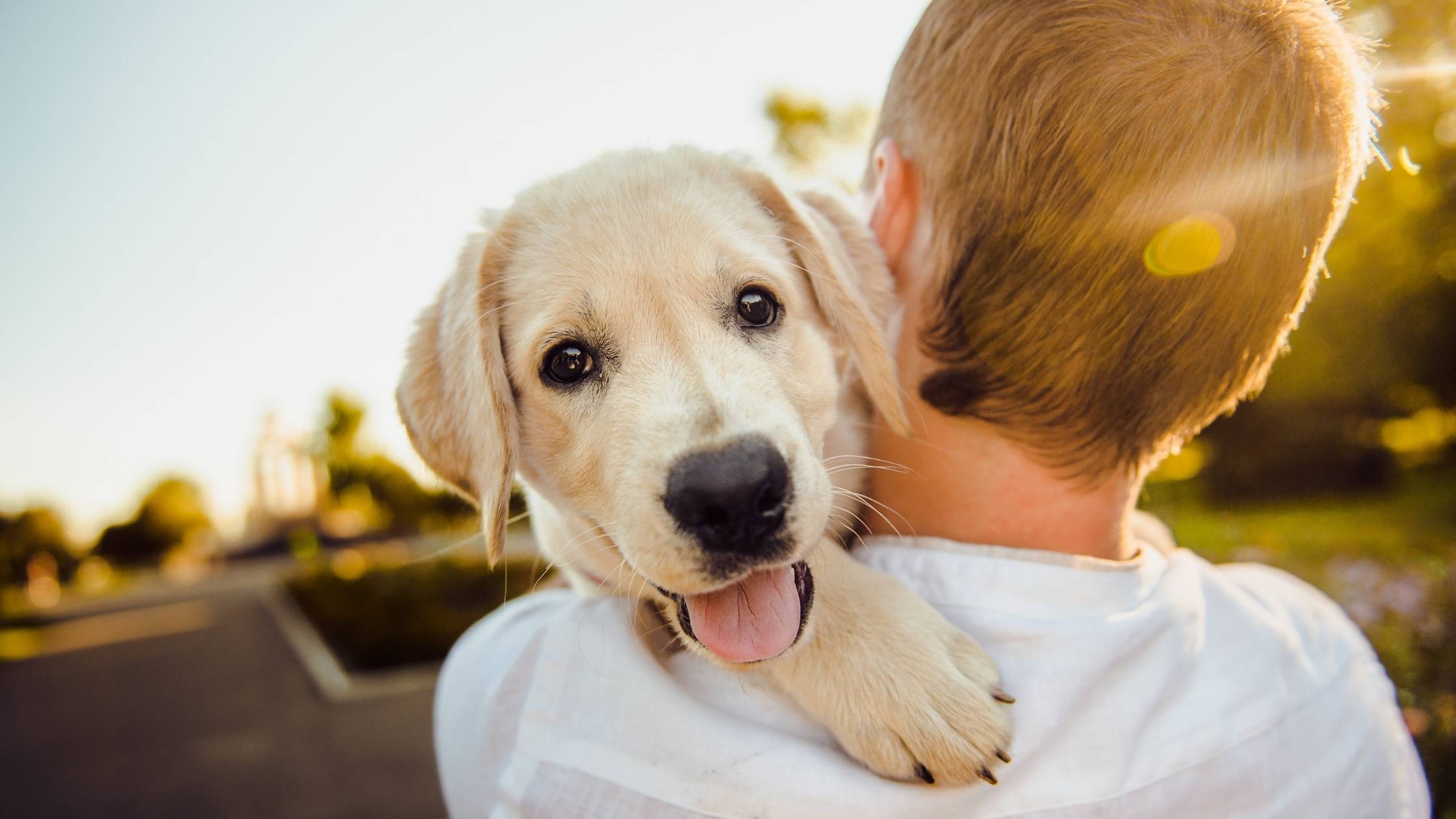Last Updated on 08/11/2021 by Veronica Jones
There’s no stopping dogs from eating anything they want to, except, of course, the ones who have been trained to possess exceptional self-control.
But for owners of dogs who have yet to reach that level, it’s highly important to pay attention to the things—even food—being left around the house. Sometimes, these sneaky dogs eat things they shouldn’t and it can be fatal.
What tastes and looks harmless to humans can lead to tearjerking situations with dogs. One of these is onions. Sure, onions make dishes taste a whole lot better, but it isn’t the same case with dogs.
So, can dogs eat onions? In this blog, we’ll discuss everything owners need to know about onions and their effects on dogs, what to do if a dog has already eaten one, and all the other toxic foods for dogs.
So, Can Dogs Eat Onions? Are They Safe?
The answer is no, dogs cannot eat onions and onions are not safe for dogs. Whether eaten in moderation or large amounts, onions are toxic for dogs and can cause anaemia, diarrhoea, vomiting, weakness, and liver damage. If the dog has ingested any form of onions, better to consult a veterinarian as soon as possible.
Why Onions Are Bad For Dogs—Raw and Cooked
As mentioned in the previous section, onions are toxic for dogs. This popular root vegetable is part of the Allium family along with garlic and leeks. For humans, it’s widely used to add taste to dishes—both sweet and spicy.
But for dogs, it’s a whole different story. The ingestion of onions, even just chewing a bit of it, releases allicin, which breaks down into an alkaloid called N-propyl disulfide.
This alkaloid causes oxidative injuries to the red blood cell membranes and hemoglobin. Damaged hemoglobins and red blood cell membranes lead to anemia in dogs, which if discovered late can have undesirable outcomes.
It doesn’t even matter if it’s eaten raw, cooked, dehydrated or powdered. For as long as it’s derived from any sort of onions, it’s sure to have adverse effects on dogs.
How much onion can kill a dog?
The fatal amount of onions that can kill a dog is approximately 15 grams of onion per kilogram weight of a dog. That means if a dog weighs 10 pounds, then the killer amount would only be half an onion—about 68 grams.
For smaller dogs, this would mean an even smaller amount of onion.
If the dog’s breed is Akita or Shiba, they’re even more susceptible to the effects of onions. So, any amount would automatically be fatal for these Japanese dogs.

What to Do if Dog Has Eaten Onions
Owners are never perfect and there’s absolutely no way of stopping anything bad from happening. While these dogs won’t necessarily like the taste of raw onion, or even cooked ones, there’s just no telling what would happen next. So, it’s best to be prepared.
Now, that leads to the question, what should an owner do if their dog has already eaten onions?
How to Treat a Dog That Ingested Onions
The best response would be to rush to the veterinarian immediately. These professionals know what to do like the back of their hands, and it’s always best to leave it in their hands.
They’ll initially ask how much onion was ingested and assess whether the dog is still safe and unharmed, or could be in a dangerous situation.
One of the procedures vets usually do to address the worst issues at hand is to flush out their stomachs or induce vomiting to remove ingested onion. That way, their fur bodies will no longer process the pieces further.

Symptoms of Onion Poisoning to Watch Out For
If there’s a vet nearby, that’s wonderful. But if rushing to the pet emergency room isn’t an option, owners should definitely be on the lookout for a couple of symptoms until their dogs can be sent to the hospital.
One symptom to look out for is weakness. It’s a common symptom of onion toxicity that sets in immediately. A few other symptoms that are quite easy to miss also include decreased appetite, lethargy, and pale gums.
Loud warning bells should ring when the dog starts to pant, vomit, or even have a high heart rate. If the dog starts to exhibit these symptoms, it’s definitely time to rush them to the vet.
Can Dogs Recover From Eating Onions?
Yes, dogs can recover from eating a few onions or so. With that said, remember the ratio of 15 grams of onion per kilogram weight of a dog.
It is, however, crucial to note that excessive consumption of onions is most likely fatal for dogs and won’t usually end well for both parties. If this happens, the only best option for owners is to rush to the vet and take extreme measures.
Other Foods Dogs Should Not Eat
It’s not just the onions and the garlic that you need to watch out for. There’s a whole list of human foods that should never be fed to these four-legged babies. Don’t let them climb over the dining table and steal a couple of bites on foods they shouldn’t be munching on.
As to what these foods are, here’s a short list of them:
- Caffeine
Yes, chocolate and coffee are some of the best things the world has to offer. But sadly, these are treats that dogs can never have. These contain methylxanthines that result in vomiting, diarrhea and panting amongst others.
- Macadamia Nuts
This specific nut contains a toxin that will leave any dog weak, swollen, and panting. Not only does it affect the dog’s physical strength, but it also wreaks havoc in their muscles and nervous system leaving permanent damage.
- Avocado
While it’s famous for its dietary benefits for humans, it’s definitely not a dog’s best friend. Persin, a substance found in avocado leaves, fruit and seed causes vomiting and diarrhea, which are already two killer symptoms that can lead to fatal outcomes.
- Alcohol
Don’t make the mistake of leaving cups of beers or shots of alcohol anywhere around a house that has a dog in it. Taking just a sip can cause intoxication that is fatal for a dog’s nervous system. Leave the alcohol to human consumption only.
- Cooked Bones
Cooked bones may look harmless but these tasty bites splinter and break. What’s even worse about cooked bones is that these don’t cause immediate responses. Sometimes, the splinters accumulate until it’s too late. Perforation of the gut is usually the worst outcome owners can expect.
- Xylitol
Commonly found in gum, candy, baked goods and toothpaste, Xylitol is a sweetener that should be kept far away from dogs. Ingesting this substance causes vomiting, lethargy and serious coordination problems in dogs. In severe cases, it can cause liver failure and blood sugar drops.
Probably one of the hardest things to watch out for is whether or not the dog has eaten one tiny piece of grape. These small fruits can cause non-stop vomiting in dogs which are precursors to kidney failure. Some effects also include depression and lethargy.
- Chips and Junk Food
Feeding dogs chips might sound fun but it’s not such a great idea. Salt in these chips can make dogs extremely thirsty. Some severe cases of excessive salt consumption even include diarrhea, depression, and vomiting.

Frequently Asked Questions
How much onion is bad for dogs?
The amount of onion depends on its size. Simply multiply their weight by 15, and the resulting number is the weight of onions in grams that’s fatal to them. However, Japanese breeds like Akitas and Shibas are particularly susceptible to onions, making any amount fatal.
Is cooked onion bad for dogs?
Yes, any kind of onion is bad for dogs, whether raw, cooked, powdered or dehydrated. This also goes for any type of onion—red, white, green, yellow, purple, etc.
Can dogs eat onion powder?
No, dogs cannot eat onion powder or anything derived from onions, for that matter. Onions contain N-propyl disulfide that can cause anemia in dogs.

Takeaway
So, can dogs eat onions? No, they cannot. Onions are toxic for dogs and can be fatal in excessive amounts. The best way to treat a dog that has ingested onions, whether on purpose or by accident, is to take them to the vet for professional help. Look out for symptoms and avoid feeding similar foods like garlic, leeks, and chives.
Regardless of being a long-term or new dog owner, here’s a good read on why onions are toxic for dogs, what to do if they’ve already eaten it, and what other toxic foods to avoid in meals.
You May Also Like:
- Why Do Dogs Eat Grass? Is it OK for Dogs to Eat Grass?
- What Fruits and Vegetables Can Dogs Eat? A Complete List
- Can Dogs Eat Jasmine Rice: Why is Jasmine Rice OK for Dogs?
- Can Dogs Eat Sunflower Seeds? Are Sunflower Seeds Safe for Dogs?
- Can Dogs Eat Pierogies?
References:
- MedicalNewsToday, ‘Why are onions good for you?’, https://www.medicalnewstoday.com/articles/276714, Accessed – May 31, 2021
- Colorado State University, ‘Guide to Poisonous Plants’, https://csuvth.colostate.edu/poisonous_plants/Plants/Details/86, Accessed – May 31, 2021
- VCAHospitals, ‘Anemia in Dogs’, https://vcahospitals.com/know-your-pet/anemia-in-dogs, Accessed – May 31, 2021
- VetFolio, ‘ Hidden Dangers in the Kitchen: Common Foods Toxic to Dogs and Cats’, https://www.vetfolio.com/learn/article/hidden-dangers-in-the-kitchen-common-foods-toxic-to-dogs-and-cats, Accessed – May 31, 2021
- ASPCA, ‘People Foods to Avoid Feeding Your Pet’, https://www.aspca.org/pet-care/animal-poison-control/people-foods-avoid-feeding-your-pets, Accessed – May 31, 2021

